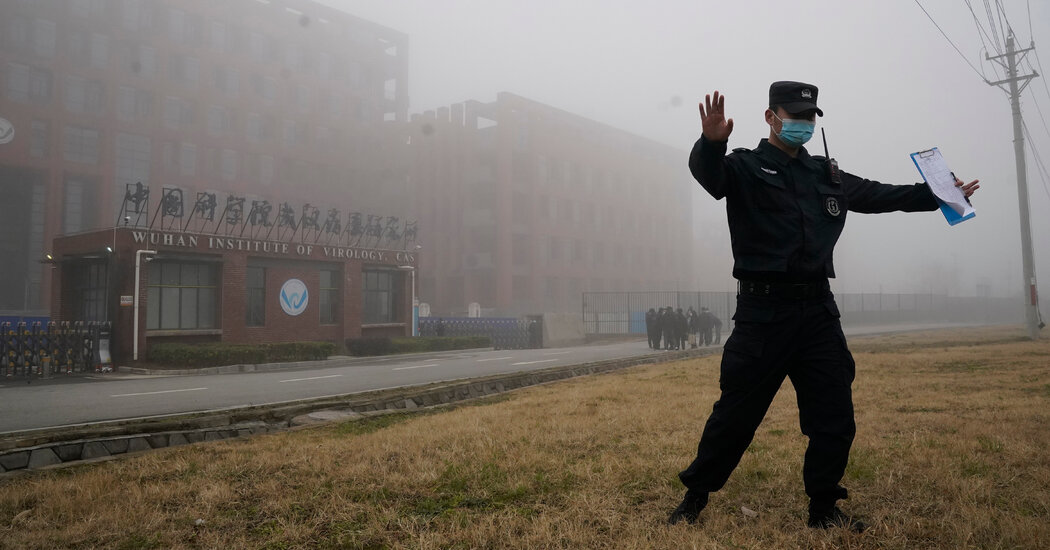Two world-renowned virologists appeared on Capitol Hill on Tuesday and delivered a pointed defense of their findings that the coronavirus pandemic was
Two world-renowned virologists appeared on Capitol Hill on Tuesday and delivered a pointed defense of their findings that the coronavirus pandemic was natural in origin, and told skeptical Republicans that Dr. Anthony S. Fauci did not exert influence over a scientific paper they wrote to that effect.
The paper is at the heart of Republicans’ unproven assertions that Dr. Fauci and Dr. Francis S. Collins, then the director of the National Institutes of Health, tried to tamp down the idea that a lab leak caused the pandemic. The virologists who testified, Kristian G. Andersen of Scripps Research and Robert F. Garry Jr. of Tulane University School of Medicine, were two of the paper’s five authors.
Tuesday’s hearing, before the House Select Subcommittee on the Coronavirus Pandemic, did not produce new evidence advancing the Republicans’ claims. The hearing was titled “Investigating the Proximal Origin of a Cover-Up” — a play on the title of the paper, “The Proximal Origin of SARS-CoV-2,” which was published in the journal Nature Medicine in March 2020.
“The claim that Dr. Fauci prompted the drafting of ‘Proximal Origin’ to disprove the lab leak is not true,” Dr. Andersen said.
The Republican accusations center on a series of email exchanges that included Dr. Fauci, who at the time led the National Institute of Allergy and Infectious Diseases; Dr. Collins; and Dr. Jeremy Farrar, then the director of the Wellcome Trust, a charitable foundation that funds health research. Dr. Farrar is now the World Health Organization’s chief scientist.
Republicans have used the emails to suggest that scientists studying the origins of the virus, after originally voicing the idea that it might have been engineered in a laboratory, changed their mind because of input from Dr. Fauci and Dr. Collins, including during a Feb. 1, 2020, conference call that included authors of the proximal origin study.
The scientists have said their views changed after days of intense work, which included studying features of the virus that were also identified in related coronaviruses in other species and consulting with virologists who had more experience studying coronaviruses.
Republicans have repeatedly asserted that Dr. Fauci convened the Feb. 1 call and pushed for publication of the paper as a way to quash public discussion of a possible lab leak. But Dr. Andersen and Dr. Garry both testified that Dr. Farrar had convened the call. And Dr. Andersen said Dr. Fauci had in fact encouraged the airing of any concerns about a lab leak.
“Specifically, I remember him saying that if you think it came from a lab, you should write this up as a peer-reviewed paper,” Dr. Andersen said in a transcribed interview with the subcommittee, recounting a phone call between the two on Jan. 31, 2020.
Dr. Farrar, who was not credited as a co-author of the study, has faced scrutiny for suggesting in a mid-February 2020 email that the authors change a sentence saying that it was “unlikely” that the virus had emerged through laboratory manipulation to one saying that it was “improbable” that the virus had emerged that way. A W.H.O. spokesman on Tuesday declined to answer questions about Dr. Farrar’s role.
In an email after the hearing, Dr. Fauci wrote that the suggestion that he had sought to “disprove the lab leak theory in the early days of the Covid-19 pandemic is categorically incorrect.” He added, “This was confirmed multiple times during the hearing by two highly respected scientists who testified to this effect under oath.”
At times, the hearing took on the air of competing science lessons. Dr. Andersen frequently began his answers with the phrase, “I think it’s important to understand …” Republican members of the panel tried in vain to lecture the virologists, sometimes making outright incorrect claims.
“I’m making a scientific point here,” the subcommittee’s chairman, Representative Brad Wenstrup, Republican of Ohio and a podiatrist, said at one point.
After the hearing, Mr. Wenstrup shook Dr. Andersen’s hand and said he hoped Dr. Andersen felt the hearing was professional. Dr. Andersen said he thought it was. But underneath the politesse, the tension between Republicans and the scientists was palpable.
Republicans repeatedly suggested on Tuesday that, because so much is unknown about the work of Chinese researchers, a lab leak was indeed possible. They theorized that U.S. officials wanted to downplay that possibility because they wanted to avoid being blamed for funding Chinese research, and that scientists wanted to avoid alienating their Chinese counterparts.
They cited in particular a Slack message in February 2020 from one of the eventual authors of the proximal origin study, Andrew Rambaut, an evolutionary biologist at the University of Edinburgh.
“Given the shit show that would happen if anyone serious accused the Chinese of even accidental release,” he wrote, “my feeling is we should say that given there is no evidence of a specifically engineered virus, we cannot possibly distinguish between natural evolution and escape so we are content with ascribing it to natural processes.”
Asked about the comment, Dr. Rambaut said in an email on Tuesday that he had been expressing reluctance to speculate that the coronavirus had escaped from a lab because there were no signs of it ever having been in a lab.
“We had no evidence from the genome that it was anything other than a virus from nature,” he said, adding, “Don’t go accusing people of things if there is no evidence.”
www.nytimes.com
